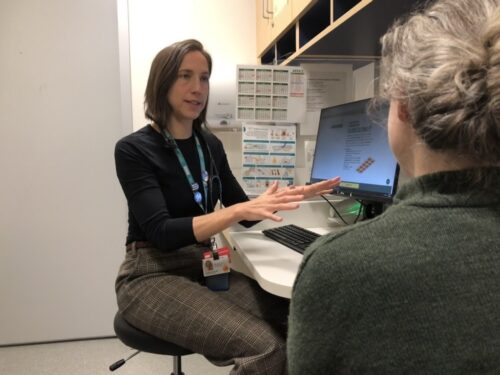'There Is a Mental Health Crisis,' Pediatric Psychiatrist Warns of Pandemic's Toll
May 18, 2021
By Meryl Bailey

Getty Images
With toxic stressors exacerbated by the COVID-19 pandemic, children from low-income families need equitable access to mental healthcare.
Much has been written about the resilience of children during the COVID-19 pandemic. That after a lost year, children will regain social connections, resume academics, and that, in the end, “the kids will be alright.” However, this hopeful narrative may only apply to children living in primarily white, well-resourced communities in households that did not experience the loss of loved ones or the stress of unemployment.
A pediatric psychiatrist practicing at Boston Medical Center (BMC), Michelle Durham, MD, MPH, sees a very different trajectory for her patients from low-income, low-resourced communities. The pandemic has affected their families in ways that no child should have to deal with: social isolation, multigenerational homes with family unemployment, no money for food, rent, or to pay utilities, and the grief of losing family members to COVID-19 and its complications.
Durham notes that the rates of depression and anxiety have increased for these children, yet access to mental health services, especially for families on Medicaid, is very limited. In addition, the mental health workforce that does accept Medicaid is strained. Durham believes we are only seeing the beginning of the psychological toll of this pandemic on communities.
She recently spoke with HealthCity about the inequities she sees in her practice, the difficulty for families in accessing needed mental health services, and the imperative for more services in the community to help children cope with the grief and trauma of the pandemic.
HealthCity: Living through the COVID-19 pandemic has been incredibly hard on families, with disruptions in schooling, job losses, and illness and death. Can you talk about how these stressors are impacting the children you see? Are you seeing an increase in patients looking for services?
Michelle Durham, MD, MPH: We saw a definite spike for children needing mental health consults in the BMC emergency department around January. That spike has not stopped, whether in the emergency room or families seeking outpatient mental health services. Over the last several months, we have seen an increase in out-of-control behavior—these behaviors mean something, especially when it comes to children and adolescents. We have to tease out what is the underlying cause of these behaviors. And so, how do we tease that out? Is that just feeling overwhelmed, depressed, and/or stressed? There are also children and teens coming in with self-injurious behavior or suicidal thoughts. Children are becoming significantly dysregulated, and families are overwhelmed with the behavior.
HC: Can you describe some of the barriers that these families face when seeking mental health services?
MD: There is a mental health crisis—and not only in Boston but in the United States—where we are seeing more and more children who need services. There has never been enough mental health services for kids, especially children who have MassHealth, like many patients we see at Boston Medical Center. We also see many undocumented children, and those particular patients have very limited insurance, more limited than MassHealth. With limited insurance, it becomes even more challenging to place children in treatment or provide them with extra supports.
With the greater need for care during the pandemic, these inequities have been exacerbated. I think society realizes we have to do something different moving forward to provide the full spectrum of care, regardless of insurance status. Even in a state like Massachusetts, where we do quite well in insuring all people in the state, there are too many limitations in accessing mental healthcare.
HC: Where are the gaps in pediatric mental health care specifically? What kind of care do these children need that they can’t access?
MD: The most significant inequities in care are for kids who have limited Medicaid because of their undocumented status. There are only two options for these children: They can receive outpatient mental health services or be admitted to an inpatient locked psychiatric unit, which is the highest level of care for mental health services. There are many services we offer along the care continuum that do not accept limited Medicaid, so these families cannot access them.
Even within those options, there are restrictions because few outpatient mental health clinics accept the limited Medicaid product. BMC is one of these providers, and pre-pandemic, these children would come in to see us face-to-face, sometimes driving two to three hours to get to BMC because we are one of the only providers in driving distance that accepts their insurance.
In comparison, other patients can access a continuum of care. For example, beyond receiving outpatient care, you may be eligible for in-home services or a partial day program. During the pandemic, in-home services are provided through telemedicine. Children on limited Medicaid products typically cannot access these services, pandemic or not.
Currently, BMC is providing therapy through telemedicine, but those visits, too, are much more difficult for low-income families. We have to consider if they have a smartphone or a laptop. Do they have a private space in their home to have a telehealth visit? Many parents are essential workers. Are the parents able to be present for the visit? The list goes on, and the difficulties just compound themselves.
HC: With so many barriers to access, children are likely not getting enough care. How can unaddressed mental health issues in childhood impact health trajectories?
MD: There is excellent research that the consequences of these multiple toxic stressors in early life can lead to many health consequences. There is evidence that the more stressors you have impacts your ability for academic success, increases likelihood of developing a substance use disorder, and impacts overall health. For example, youth may have risk-taking behavior, including substance use, smoking cigarettes, and alcohol use, which can lead to physical and mental health issues such as diabetes, high blood pressure, and depression, to name a few. These are the issues that healthcare ends up treating downstream because we did not treat what was happening for these young people at an early age.
HC: Beyond improving access for these children in the clinical setting, including expanding Medicaid to make sure that children can receive the spectrum of mental health services they need, what measures can be taken to improve mental health outreach in the community?
MD: We need to meet kids where are they are. School-based mental health services can have a significant impact. Children are being reintegrated into school after more than a year—a year during which they have witnessed the death of potentially family members and endured many losses. We need a plan for how we support them as they reintegrate into school.
It’s not the teacher’s job to provide mental health support—they already have so much to do. We need to have therapists in every school. They can recognize symptoms in youth, provide necessary support, educate the staff, and have check-ins with students. We need a trauma-informed approach in schools to support youth through not only the pandemic, but also for what they may be witnessing in their own communities.
There are barriers to make this a reality. Resources are not equally distributed to those schools that need them most. Similar to how your zip code determines life trajectory, how schools are resourced depends on the zip codes. We need to start distributing that wealth. It is very well-documented that Roxbury and Dorchester Schools have limited access to mental health resources. If you literally go half a mile to Brookline, they have more access to mental health professionals. I hope we can all agree schools in all zip codes should have access to mental health resources equally. This situation is the definition of systemic and structural racism.
Secondly, partnering with community organizations and places of worship can further expand how we talk about mental health and destigmatize what it means to see a mental health professional when you need help. We can do this by partnering with community leaders as they are in the community, know the community, and can speak the language of the community, in ways that obviously we just don’t in academic settings. We need to do a better job of bridging that divide and really just listening to what the community needs and how we can help support their needs.
HC: What else has surprised you as you work to provide therapy for children during the pandemic?
MD: Even pre-pandemic, our families were already struggling. They were already living check to check, juggling two or three jobs, trying to maintain a household. Sometimes grandparents, aunts, uncles, and cousins are also living in the home. People are sharing rooms, and there was food insecurity.
During this unprecedented time, they are still showing up for these appointments. They’re holding it all together in ways that I don’t know how they do it. They were already dealing with so much, and I think what the pandemic has done for these families is shine a blazing light on what was already happening in their lives.
And so, for me, as a provider who felt a bit helpless before sometimes, it’s feeling hopeful that policymakers and other decision-makers start to understand how difficult life is for our families and why people need to have a standard minimum income and be able to have a roof over their head all the time. They’re working really hard, and during the pandemic, they showed up in ways that they shouldn’t have had to, quite frankly.
This interview has been edited and condensed.


